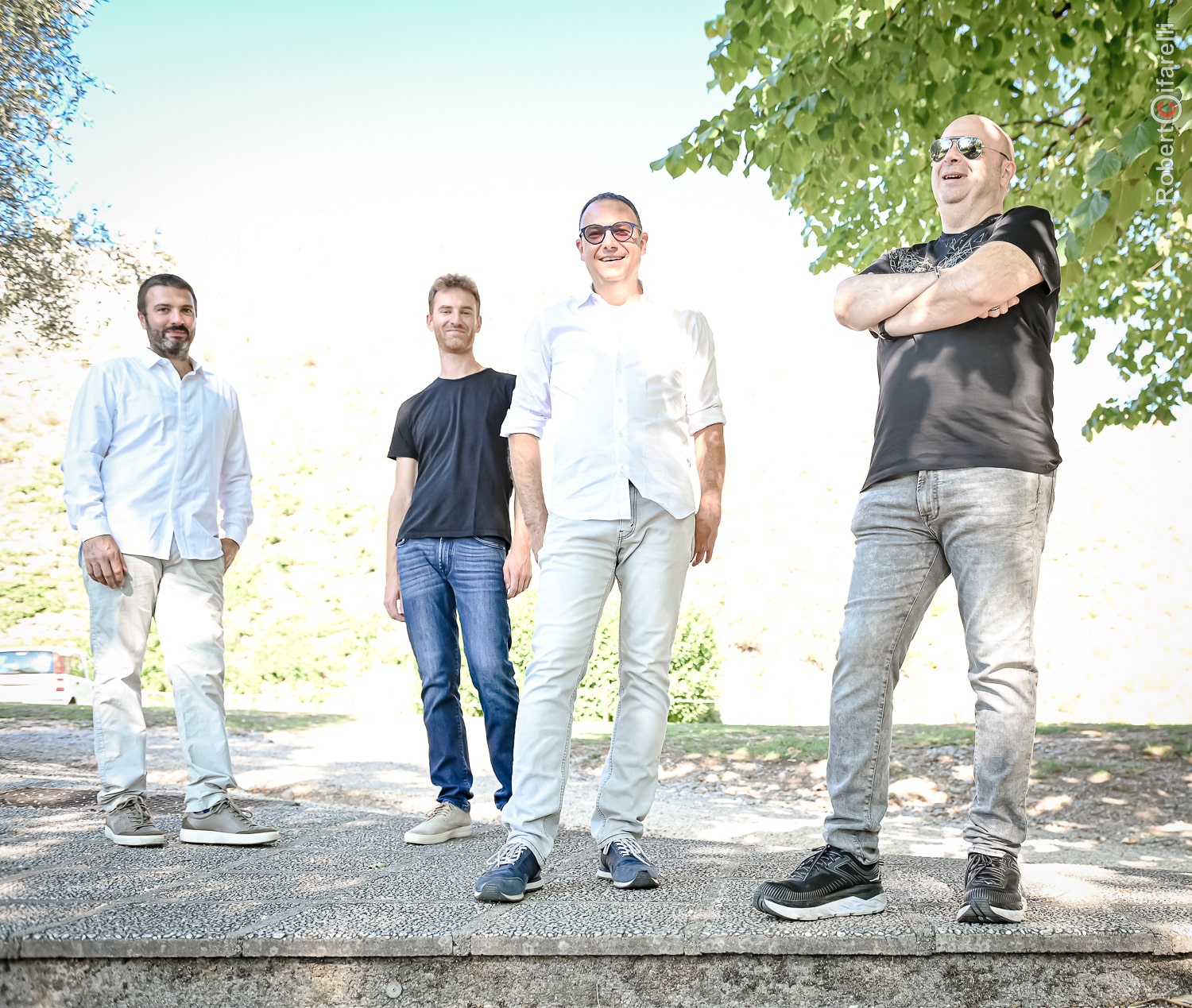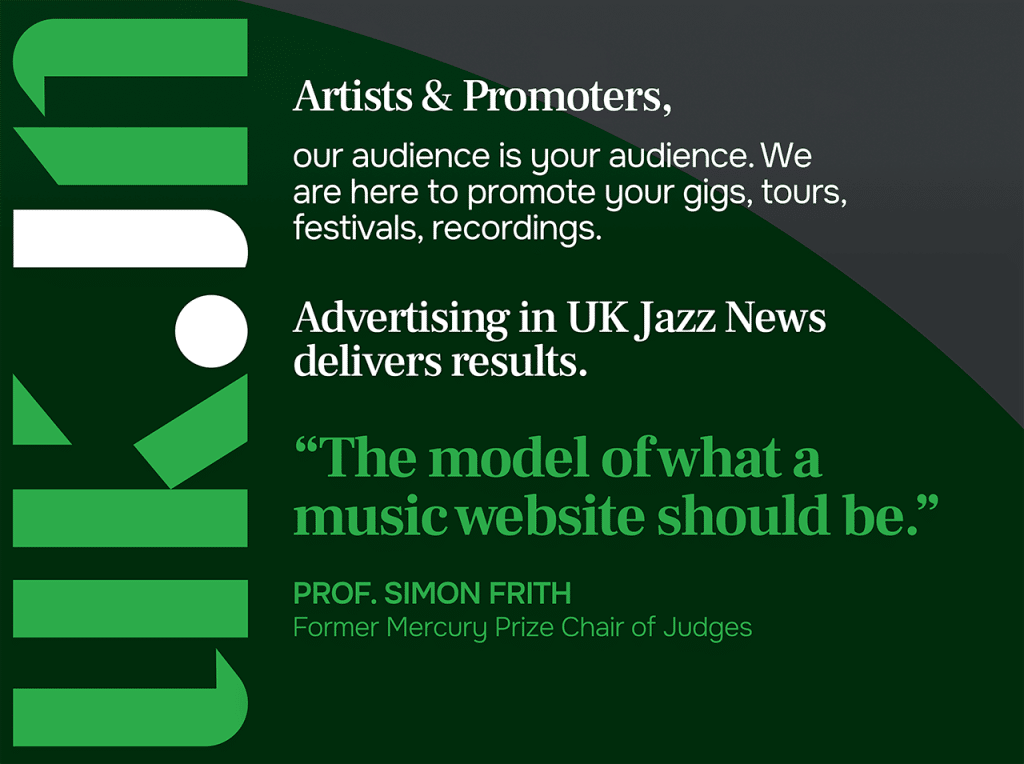Trumpeter Fulvio Sigurtà originally came from Italy to the UK in 2004, to complete his studies with a Masters at Guildhall School…and then stayed here for fourteen years.
He is now based in Italy again full-time, and has established an impressive presence on the scene. He is excited by his new group with Stefano Onorati, Alessandro Paternesi and Gabriele Evangelista. They take their musical role model from “the quintessence of risk, and therefore the quintessence of trust” of Wayne Shorter’s last quartet, and have just released an album ‘Extended Singularity’ (Caligola Records), the latest addition to the trumpeter’s star-studded discography (link below).
UKJazz News: Take us back….After your studies at Guildhall, how did you get established on the London scene?
Fulvio Sigurtà. I got into the scene quite quickly, especially thanks to a dear friend, Graham Fox, who is not with us anymore unfortunately, but whom I’d like to remember in this interview. I miss him a lot. Anyway, I started doing gigs almost immediately, playing many different types of music. I don’t know what it is like now, but in 2004 London was very open towards new musicians in town.
UKJN: What are your best memories of your time in London?
FS: I guess the fact that the city it is so cosmopolitan and that you might end up playing and hanging out with people from all over the world has always been fascinating to me. I love getting to know other cultures. That is probably why my initial intention of staying for one year became 14 years of my life.
UKJN: You now have an active live as a player and teacher in Italy. Tell our readers more about that.
FS: In December 2014. when my London life was pretty settled, and I had no plans to go back to Italy to live, I received a phone call from my friend Marco Tamburini to dep him out at the Siena Jazz summer seminar because he was busy. That was destiny calling. Marco then had a terrible accident in 2015 and I got asked to take over all his teaching. I tried for the next few years to stay in London, teach in Italy…and play wherever…but it was hard, expensive and not exactly carbon-friendly. So now I’m happily back in Italy but missing my London friends a lot, of course.
UKJN: And it looks like you are close to the heart of the Italian scene..
FS: Over the years I got involved in many projects. I love to be part of bands, I don’t see myself playing exclusively with my own band. Playing and studying other people’s music, trying to put my own personality and view to serve other people’s music it has always been my priority, my job in this world and I try to do it at my best. So that is probably why I got to play with many established jazz musicians in Italy. I feel I’m lucky.
UKJN: How did you meet the band mates on your album and what has drawn you to want to record with them?
FS: I started a duo with Stefano Onorati a few years back, playing some originals and other music from our heroes: Kenny Wheeler, John Taylor, Keith Jarrett. But then we wanted to do an experiment so we asked drummer Alessandro Paternesi, with whom I played and recorded a lot over the last ten years, to join us. We did a few gigs as a trio, using lots of electronics. Then we asked Alessandro to choose the bass player for the band. His choice was Gabriele Evangelista, right now the most in-demand bass player in Italy (Rava, Bollani …you name it) They know each other well and they love playing together. From the first gig we found that there was something quite unique in this quartet.
UKJN: ...and what are the things you like and which resonate with you in their playing…?
FS: Alessandro, who is a great straight ahead jazz drummer has a classical background. In the last few years he took a very personal musical path, playing open and lyrical but within a strong sense of groove. He can play extremely sparse and still make your body move. Same for Gabriele, whose playing is always unpredictable and yet so clear.
UKJN: And you collectively take inspiration from the last Wayne Shorter Quartet. What aspects of their way of working do you try to bring to life?
FS: For all of us, the last Shorter quartet represents the peak of what it means to play with freedom and how to manage the energy within the music. The fact that it’s not about what you play on your single instrument but how what you play fits in the collective direction of the music, moment by moment. It’s a total no-ego kind of playing where ideas are dosed carefully and taken in very serious consideration by everyone. To me it’s the quintessence of risk, and therefore the quintessence of trust. Shorter started this process long ago, in the Plugged Nickel recordings.
In the band we never talk about the music we are about to play. It is not necessary and any direction the music takes is just a new opportunity.
UKJN: Do you take naturally to the role of bandleader and how does it work with these musicians?
FS: Stefano and I are in some ways both the leaders of this quartet, primarily because we write the music for it. Every band needs somebody that takes care of finding gigs and stuff but, musically speaking, this band does not really need a leader. Actually quite the opposite.
UKJN: Tell us about the album and how it’s put together…
FS: The music that we recorded in this first album is a setlist of let’s say 9 different moods. Starting with a slow shuffle (A moment and then), moving to a more contemporary melody that leads the band to play quite suspended the whole time (Quintessence). Then we have a rather epic vibe (Thrills) followed by a mysterious ballad (OsloTwilight).
“Parallel Dimension” is a dense and busy contemporary jazz tune. “Swami” is based on a Korvai my Indian music teacher taught me a few years ago. Then we have an open and lyrical tune called “Out of the Blue”. To follow, there is a sort of jazz waltz, paying homage to what we now call European jazz (Nighthawks) and, to end, (First Scene) is yet another filmic melody to say “ hey …goodbye! See you in the next scene!”



One Response